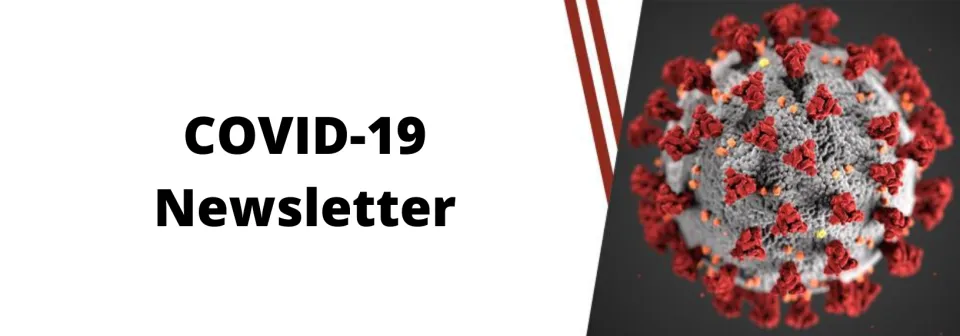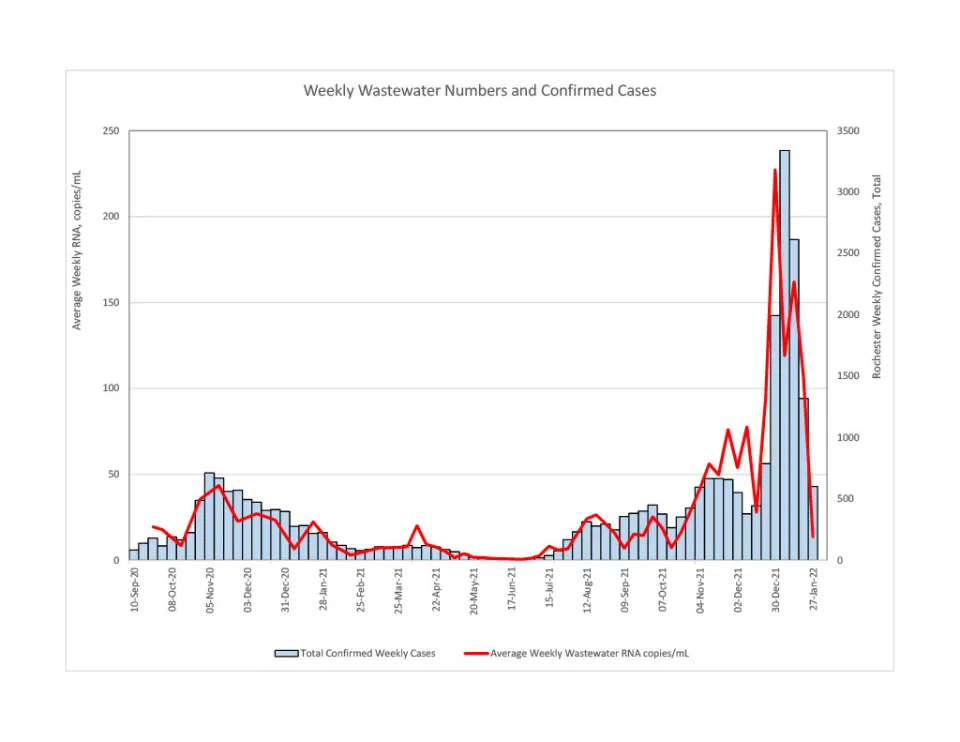COVID-19 newsletter - February 10, 2022

Cases down, but Olmsted County still classified as community of high transmission
For the first time in over a month, the weekly number of Olmsted County residents with COVID-19 is under 1,000. While this is great news, Olmsted County Public Health Services (OCPHS), Mayo Clinic, and Olmsted Medical Center (OMC) remind people to keep following COVID-19 mitigation measures as the virus still poses a threat to individuals and the community.
The Centers for Disease Control and Prevention (CDC) still labels Olmsted County as a community of high COVID-19 transmission. The CDC recommends mask use in communities with substantial and high transmission and in areas with positivity rates over 10 percent.
The key to bringing the pandemic to an end is getting people vaccinated – as many as possible. While COVID-19 continues to be a serious threat to public health, we have the tools to help us stay healthy. We know vaccination, well-fitting masks, and testing all work to reduce the spread of COVID-19 and can help keep us on the path to ending the pandemic.
Visit the Mayo Clinic News Network for more on this topic.
Get your vaccine and booster!
The COVID-19 vaccine continues to be highly effective in reducing the risk of severe disease, hospitalization, and death. And, the booster significantly increases protection against COVID-19, with the goal of ensuring people have optimal protection against infection, severe illness, and death.
The CDC strongly encourages COVID-19 vaccination for everyone five and older and boosters for everyone 12 and older. Vaccination is the best way to protect yourself and reduce the impact of COVID-19 on our communities.
Pfizer boosters are available for everyone 12 and older five months after completing the primary series. Only people 18 and older may receive the Moderna (five months after vaccination series) or Johnson & Johnson (two months after vaccination) booster.
Breakthrough infections in those vaccinated
While COVID-19 vaccines are highly effective, no vaccine provides 100 percent immunity. Scientists and medical experts continue to monitor how long immunity lasts, including after receiving a booster, and how well the vaccines protect against new variants of the virus.
Data continue to show that the COVID-19 vaccines are extremely effective in protecting fully vaccinated people from catching and spreading the virus, and scientists continue to monitor vaccine efficacy for new variants. A small percentage of vaccinated people experience breakthrough cases, but they are much more likely to have milder symptoms than unvaccinated people who get COVID-19.
Unvaccinated people continue to account for the vast majority of severe cases, hospitalizations, and deaths from COVID-19. A study published in January 2022 shows that vaccination provides greater protection against COVID-19 compared to prior infection alone, emphasizing the importance of being up to date on COVID-19 vaccination.
The risk of severe illness from COVID-19 is elevated for some groups — including older adults, people with underlying medical conditions, immunocompromised people, and pregnant or recently pregnant women. If you have questions about your risk of COVID-19, how to protect yourself, or the vaccines, speak to your health care provider.
Read more about the COVID-19 vaccine on the Mayo Clinic News Network.
Wastewater surveillance
In response to the COVID-19 pandemic, the CDC launched the National Wastewater Surveillance System (NWSS) in September 2020. The CDC developed the surveillance system to coordinate and build the nation’s capacity to track the presence of COVID-19 in wastewater samples collected across the country.
The human body sheds remnants of a COVID-19 infection before it begins to show symptoms. When someone has COVID-19, their body is shedding coronavirus RNA. This molecule, which acts like a fingerprint, can be found in the body’s waste. Because this molecule is detectable in human waste 3-8 days before someone can get tested, scientists can monitor wastewater to help forecast future COVID-19 cases and identify locations where the virus may be spreading.
CDC’s NWSS works with health departments to track COVID-19 levels in wastewater so communities can act quickly to prevent the spread of the virus.
In Rochester, the city collects the wastewater samples and the samples are then sent to Mayo Clinic. Mayo Clinic extracts RNA from wastewater to detect how much COVID-19 is present. University of Minnesota Rochester provides a lab technician to assist the lab work at Mayo Clinic. Olmsted County provides oversight and financial support. The data is shared with all parties and is reviewed for accuracy and compared with positive case numbers to determine trends.

Local wastewater data can also be found on the CDC website. The data shares COVID-19 presence calculated over a 15-day window.
Every week, more than 40 treatment plants in Minnesota also gather and analyze wastewater to monitor COVID-19 virus prevalence. These plants cover nearly 67% of all Minnesota residents.
Updates from OCPHS, Mayo Clinic, and OMC
Olmsted County Public Health Services (OCPHS)
COVID-19 cases are starting to decline. The previous week saw about 800 cases, bringing Olmsted County down to less than 1,000 weekly cases for the first time in over a month. While cases decline, Olmsted County remains a community of high transmission, so masking and other mitigation efforts are still recommended. OCPHS gave about 81 vaccines over the past week at clinics throughout the county. Visit the Olmsted County COVID webpage for the latest updates.
Mayo Clinic
Patients ages five and older are eligible to be vaccinated and patients 12 and older are eligible to receive the booster five months out from their second vaccination.
Individuals or parents and guardians can self-schedule a vaccination appointment now:
- Use your Patient Online Services account to schedule an appointment online or through the Mayo Clinic app.
- Call the Rochester campus Monday through Friday from 8 a.m. to 5 p.m. or weekends from 8 a.m. to 1 p.m.: 507-538-4040.
- If you don’t have a Patient online Services account, call Mayo Clinic Customer Assistance at 877-858-0398.
If you are eligible to receive a booster dose COVID-19 vaccine, check COVID-19 vaccine options by Mayo Clinic campus.
For more information on the COVID-19 vaccine and boosters, visit the Mayo Clinic COVID-19 vaccine information site.
Mayo Clinic expands testing hours
COVID-19 testing is performed at the 41st Street Testing Center at 3033 41st Street NW in Rochester. The testing site's hours are now 8 a.m.–8 p.m. daily.
Scheduled appointments are required for testing. Call the COVID-19 Nurse Line at 507-293-9525 or contact your primary care provider for screening.
Olmsted Medical Center (OMC)
Hours at OMC’s COVID-19 Testing Site at FastCare North
OMC’s COVID-19 Testing Site is open Monday through Friday, 8 a.m. – 5 p.m. The location is closed for lunch from 12:30 – 1:30 p.m.
There are two ways to make an appointment to be tested:
- Call the COVID triage line at 507-292-7266 during the hours of 8 a.m. – 5 p.m., Monday through Friday.
- Schedule an appointment online using the patient portal, OMC MyChart. After you sign into your OMC MyChart account, select “Symptom Checker” from the Menu.
COVID-19 Vaccinations
OMC is scheduling COVID-19 vaccination appointments for children ages 5-11. In addition, OMC is offering pediatric vaccination clinics every Saturday. To schedule an appointment, call 507-292-7300.
OMC is offering the Pfizer vaccine booster for patients 12+ who completed their primary series with Pfizer, Moderna, or Johnson & Johnson (Janssen). OMC also continues to offer appointments for first and second doses for the Pfizer vaccine. Appointments are available on Thursdays.
Employees, vendors, patients, and visitors are reminded to wear a surgical mask when in OMC buildings. If needed, patients and visitors will be provided a surgical mask to wear when going through the screening process. Patients who have their own surgical mask are invited to wear them when visiting an OMC building.
Available in OMC MyChart: Online scheduling for the Pfizer COVID-19 vaccine
OMC patients are able to schedule an appointment for the Pfizer COVID-19 vaccine through the patient portal, OMC MyChart. Appointments can be scheduled for a first dose, second dose, or booster.
When you arrive at the vaccination location, you will be asked a series of questions to be sure you are eligible to receive a COVID-19 vaccine. Please bring your vaccine card with you to the vaccination appointment.
Need to schedule a COVID-19 booster? Visit the OMC website to see if you qualify. The U.S. Food and Drug Association (FDA) has created a chart that helps explains the qualifications for a COVID-19 booster.
Please note: If you are sick, in isolation/quarantine, or you have had monoclonal antibody therapy in the last 90 days, you should not schedule a COVID-19 vaccine appointment at this time.
